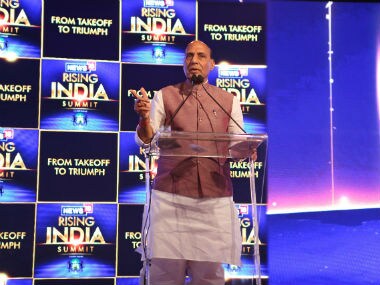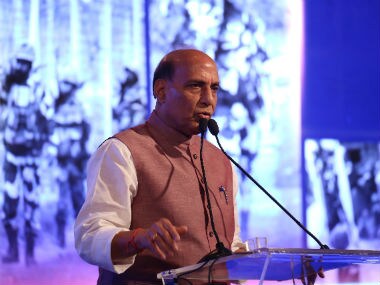Home Minister Rajnath Singh said on Saturday at News18's Rising India Summit that strong decisions and strong legislation need to be taken for the interest of nation-building.
If Prime Minister Narendra Modi wants this nation to be a ‘New India’ and a ‘self-reliant India’ by 2022, such strong decisions need to be taken when it comes to national security.
Former prime minister Manmohan Singh had termed Naxalism as the biggest challenge to India’s internal security.

Home Minister Rajnath Singh at the Rising India Summit.
Will Modi government be able to take strong decisions and bring procedural and infrastructural changes in our system to curb Naxalism, insurgency and terrorism, which have almost become part of our lives?
“Bringing a sense of security amongst citizens is must,” asserted Home Minister.
But, how? Especially when we get to hear about deaths of our security personnel every month in Maoist-infested states. The recent deaths of nine CRPF personnel at Sukma in Chhattisgarh, who were killed when Naxals blew up a Mine Protection Vehicle (MPV) on 13 March, shook the nation.
Presenting data, Rajnath Singh said in the late 1980s, more than 3,000 incidents of Maoist attacks occurred, which has declined to less than 1,000 at present. But, it’s still alarming.
Lack of basic amenities in Maoist-infested districts has given opportunity to the Naxals to fan the dissent of the tribals and villagers, and get support from the latter to spread Naxal ideology.
What’s the way out?
Singh came up with a host of steps as part of his prescription — right things to be done to address this Naxal menace.
First off, the home minister said that bullets cannot be the only solution. Development of backward and tribal areas needs to be taken up simultaneously. “There were many places without telephone connection. But today, we have mobile towers, hospitals and schools. Government is reaching out to those areas. Our prime minister thinks that if India has to be an economic superpower, the last man in the society — the under-privileged, poor and marginalised section of the society — should be economically empowered,” said Singh.
Nobel laureate and American Economist Paul Krugman said in the summit that there has been a dramatic change in India’s policy. The home minister said that the Modi government, through structural and procedural changes in the system, has been trying to minimise corruption, reach out to people who have been deprived of basic amenities and ensure central assistance reaches to Maoist-infested districts.
The home minister said the crisis of credibility amongst politicians is a big challenge. “For decades, our politicians have been promising people but had those been fulfilled, India would have become a developed nation. This has given rise to crisis of credibility. It’s a big challenge before us and we are working towards getting rid of it,” Singh remarked.
Singh also refused to call people who share a different ideology ‘traitors, anti-nationals or ‘Desh-drohi’. “We shouldn’t call anyone with a different ideology as ‘Desh-drohi’ but if one's actions hurt our nation, the law will punish the person concerned,” he emphasised.
What experts feel
Defence expert Maj Gen (retd) Dhruv Katoch is optimistic about government’s initiatives in curbing Naxalism and terrorism.
“We’ve a long way to go, taking 2014 in account when Narendra Modi became our prime minister. National security is stable today as compared to 2014. Naxal problem is 50 years old and we can’t expect it to get resolved in a year or two. As far as terrorist and Maoist activities are concerned, the level of violence has come down in comparison to the past. Government has given free hand to the army while dealing with cross-border issues and with Pakistan. Today, the country is stable politically and economically,” added Katoch, director, India Foundation and former director, CLAWS.
Prakash Singh, an authority on Left Wing Extremism (LWE) and an author, feels that besides strong measures like eliminating Maoists, the government has to take care of the people in Maoist-infested areas.
“Unless the government addresses the basic problems faced by the tribal people, properly implements the Forest Rights Act and rehabilitates displaced Adivasis from their land, the Naxal menace won’t end; rather, it will erupt in a gigantic proportion. Maoists are getting powerful. Once the Maoist activities are curbed through cleansing operation, the administration should step in to win heart and mind of the people,” said Prakash Singh, former chief of Border Security Force and former DGP, Uttar Pradesh.
Rajnath Singh said most of the right things at Rising India Summit on Saturday, but how about dealing with those yet to be addressed? Maybe the home ministry is working on those areas as well, as promised by the home minister.
Published Date: Mar 17, 2018 14:23 PM | Updated Date: Mar 17, 2018 14:23 PM



